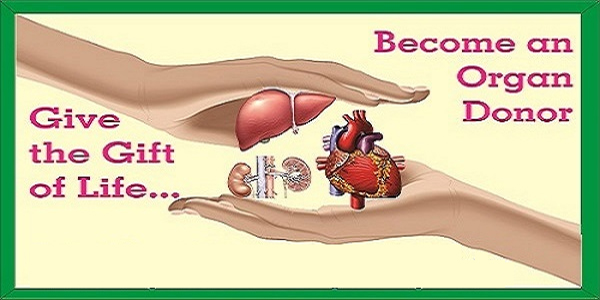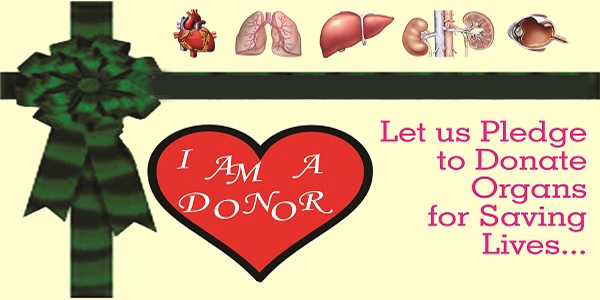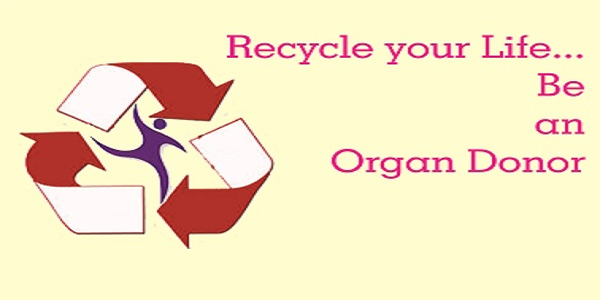Organ Donation



Organ Donation
Organ donation is a noble act, which gives an opportunity to save lives after brain death or during one's life. Many patients suffer from last stage of disease of heart, lungs, kidneys, liver, etc. The donated organs are transplanted into these very sick patients to increase their survival.
There are mainly two types of organ donation; Living organ donation and deceased organ donation.
Living organ donation: A person more than 18 years of age can voluntarily donate his organs to his/her spouse, near relative under a legal framework. He can donate one kidney or half of his liver during his lifetime without any ill effect to his health.
Deceased organ donation: A person of any age can donate many organs after his/her brain death. If he/she had pledged to donate his organs, and near relatives give consent for organ donation after brain death, organs can be harvested and transplanted into a suitable recipient in a registered Hospital.
Brain death (Brain-stem death): A person can die when his heart stops or his brain dies irreversibly. In brain death, patient is in a deep coma like state, but there is no brain activity or respiration. Brain dead patient is on ventilator in an ICU, the usual causes being head injury or brain hemorrhage.
The heart and others organs are functioning but he/she cannot take a single breath without ventilator. The patient cannot be in such condition on ventilator for long and eventually all other organs will also die within few days. If near relatives give consent, the organs can be removed surgically from such patient between the time from his brain death to cardiac death.
Coma is different from brain death because in coma there is brain activity and patient can become alive. However a brain death patient can never come to life again, and even death certificate can be issued in such case.
Brain-stem death declaration: It can only be declared by a team of four experts who are appointed by government. Full proof tests are done by the experts twice after a period of 6 hours and there is no chance of an error. Organs can be taken out surgically only after brain death certification and after the consent of the near relative or spouse.
Green corridor: when the organs are removed from a brain dead donor these organs should be quickly transplanted to a patient as the life of organs outside the body is very short (few hours). For example, the life of heart is 4 hours; of liver, 10 to 12 hours and of kidneys, 24 to 48 hours. If the transplant facility is in other hospital, then these organs have to be transported by aeroplane or ambulance very quickly. To achieve this, city administration and police work together to create traffic free roads, and all signals are turned green during organ transport.
Law: Organ donation and transplantation is permitted by law and covered by transplantation of human organ act (THOA). This act regulates removal, storage and transplantation of organ for saving lives and prevents commercial dealings. No human organs can be bought or sold; if done, there is severe punishment to the transplanting team and persons involved. The law also requires every hospital having a ICU facility to identify brain dead patient and request near relative to think about organ donation. Medical social workers or transplant coordinators are the key persons involved in grief counseling and one should corporate in this noble cause.
Donor card: One can pledge to become an organ donor and can have donor card. This shows that you have expressed your wish of becoming organ donors to your family. Even if somebody is having a donor card and becomes brain dead, the consent of family members is must. One can generate donor card by registering at notto.nic.in, mohanfoundation.org or at divisional organ and tissue transplant organization (DOTTO) office at NSCB medical college, Jabalpur.
Cornea Transplant: Cornea can be harvested from deceased donors as well as from persons who die at home, or suffered cardiac death due to any disease in a hospital. Cornea need to be removed from such dead body within 6 hrs of death by eye bank’s doctors.
Body Donation: Body donation is another noble act in which in the event of death at home or hospital, the whole body can be donated to a medical college or institute for research and training. No organs except cornea or few tissues can be used for transplantation in such case.
Myths and facts.
One of the reasons for the donor shortage in this country is the many myths and misconceptions clouding the issue. A survey conducted by a national newspaper showed that 28 % of a total of 641 urban respondents believed that organ donors will not receive any life saving treatment while 18% believed that their body will be mutilated (TOI 30th July, 2013). These misconceptions deter people from becoming donors, and many lives are lost due to severe shortage of donors.
Myth: Organ donation is not necessary in India
Reality: Unofficial statistics from India indicate that there are nearly 300 deaths every day due to patient suffering from one or another organ failure. India needs organ donors. Of the 9.5 million deaths in India every year, at least one lakh are believed to be potential donors; however less than 200 actually become donors. The conversion of these brain dead patients into donors would take care of the long waitlist of end stage organ failure patients.
Myth: If I had earlier agreed to donate my organs, the hospital staff won’t work hard to save my life. Even if am not brain dead, the doctors will certify me brain dead for the sake of organs.
Reality: When you go to the hospital for treatment, doctors focus on saving your life – not somebody else’s. The doctor in charge of your case in not a part of transplant team. Similarly the members of brain death declaration committee are not a part of transplant team.
Myth: I have always understood that when an individual dies, the heart stops beating. Since my loved one’s heart is beating, he is still alive. Can I come alive from Brain death condition?
Reality: The heart has its own pacemaker independent of the brain. As long as it has oxygen, it continues to beat. Therefore even in brain death patient it can continue to bead and maintain blood supply to other organs for few days. Eventually, the heart will stop, despite being on maximum life support machines. There has not been even a single case in the world at all times where a brain dead patient has come alive.
Myth: My religion discourages organ donation. Organ retrieved will be absent if I am reborn.
Reality: There are 22 major religions in the world, none of which discourages organ donation. Being a very noble act by which one human can provide life to another, most religions support organ donation. No religion tells that if you donate organs, in next life, you will be devoid of organs. Scientifically also this is an absolute nonsense.
Myth: I’m too old to donate. Nobody would want my organs.
Reality: There’s no defined cut off age for donating organs. Organs have been successfully transplanted from donors in their 70s and 80s. The decision to use your organs is based on medical condition which is assessed by the team. Myth: When somebody is waiting for a transplant from a deceased donor, his financial or celebrity status can fetch him organ ahead of more needy patient.Reality: When somebody is on the transplant waiting list for an organ, what really counts is the severity of the illness, time spent waiting, blood type, and other important medical information. Income and social status have no bearing when determining how organs are allocated, and government authorities. Selling and buying of organ in deceased organ donation or living organ donation is illegal and has very severe punishment.
Myth: If you agree to donate your organs, your family will be charged for the costs of retrieval.
Reality: There is no cost to the donor's family for organ and tissue donation. Funeral costs remain the responsibility of the family.
Myth: Organ/tissue removal will disfigure the body and affect cremation/burial arrangements.
Reality: The removal of organs or tissues will not interfere with funeral or burial arrangements and body is not disfigured. A highly skilled surgical transplant team removes the organs and tissues which can be transplanted in other patients. Surgeons suture up the body carefully, and only s scar is present after the organs are removed like in other surgeries.
Myth: Once I become an organ donor I can never change my mind. If I fill for Donor Card, I will die soon.
Reality: You always have the option to change your mind. You can withdraw your registration by informing the registry, tear up your organ donor card and let your family know that you have changed your mind. Many persons have made their donor cards several years back and living healthy. It is only if somebody dies due to brain death as a result of head injury or brain hemorrhage and is in ICU on ventilator and the family consents, organs can be donated.
Being an organ donor can make a big difference not just to one person. By donating your organs after you die, you can save 8 lives which is surely an act of god.